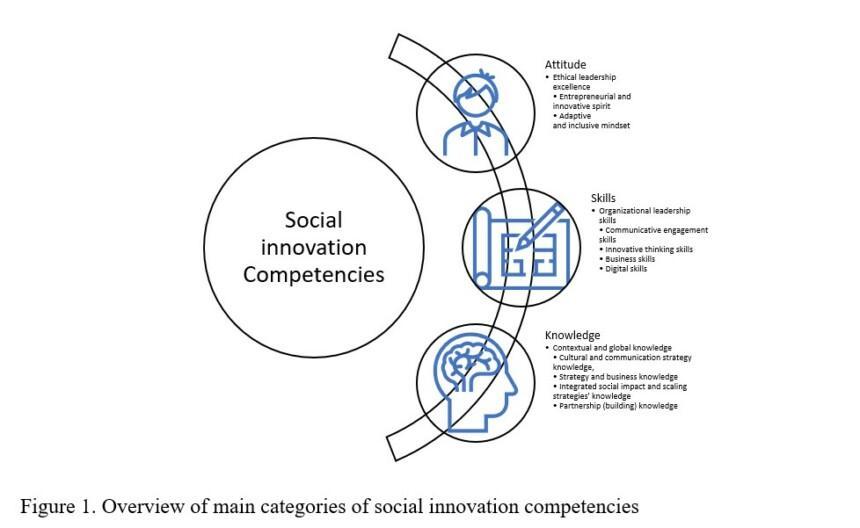
Enhancing social innovation capacities: Introducing the European Social Innovation Campus Initiative
The European Social Innovation Campus (ESIC) initiative aims to enhance social innovation capacities along the European Social Economy Transition Pathway. This article delves into the comprehensive strategy employed by the ESIC project consortium to address the urgent need for upskilling and reskilling of the workforce and entrepreneurs within the social economy sector, particularly considering the green and digital transitions.
Through collaborative efforts with higher education institutions, vocational training organisations, social economy entities, and stakeholders at the European level, ESIC facilitates the development and dissemination of innovative skills and knowledge crucial for navigating the evolving social economy landscape. By leveraging evidence-based practices and adopting a transnational approach, ESIC seeks to empower individuals and organisations with the necessary tools and competencies to drive sustainable social change and foster inclusive growth. Additionally, the article emphasises ESIC’s focus on identifying effective pedagogical methods to cultivate these competencies, aligning with market dynamics and societal needs, to craft a comprehensive skills strategy report for social innovation education and learning.
Furthermore, the research provides insights into the knowledge, skills, and attitudes essential for successful social innovators, particularly social entrepreneurs. These findings not only inform the creation of specialised training programs for social entrepreneurs across diverse cultural contexts but also have the potential to inspire the development of curricula in related fields such as social entrepreneurship, entrepreneurship, CSR, and non-profit sectors.
Additionally, the research findings serve as a baseline for further exploration into different branches of social innovation and the broader social economy. They offer inspiration for conducting similar research in other contexts and present a systematic approach to periodically enhancing educational offerings in these areas. Moreover, the findings can be utilised as a checklist for consulting purposes with social entrepreneurs and supportive organisations, aiding in identifying strengths and weaknesses in their competencies to bridge skill gaps more effectively.
ESIC – enhancing European capacities for social innovation
This article delves into the European Social Innovation Campus (ESIC) initiative, established with the European Commission’s Transition Pathway for Proximity and Social Economy (2023) and the Blueprint for Sectoral Cooperation on Skills (Blueprint for Sectoral Cooperation on Skills – Employment, Social Affairs & Inclusion – European Commission, 2021), which seeks to enhance European capacities for social innovation.
Joining the Pact for Skills on Proximity and Social Economy, ESIC contributes to the challenge of the upskilling and reskilling of 5 percent of the workforce and entrepreneurs of the sector each year to tackle the green and digital transitions in the social economy by boosting social innovation capacities. ESIC aims to bolster Europe’s innovation capacity by fostering collaboration and knowledge exchange among higher education, vocational training, and the broader socio-economic landscape, including research. It focuses on enhancing innovation, particularly digital skills, and addressing the demand for green skills in a circular economy, aligning with overarching growth strategies outlined by the European Commission.
The ESIC initiative targets immediate and medium-term skills development needs, aiming to mobilise stakeholders for workforce upskilling, green and digital transitions, and support for skills and growth strategies. As a blueprint project for sectoral cooperation on skills, the ESIC initiative seeks to address skills gaps within specific sectors by developing tailored sectoral skills strategies. These strategies, informed by assessments of digital and green transitions’ impact on job roles and skill requirements, aim to provide concrete solutions such as curriculum updates and qualification enhancements based on evolving occupational profiles. Ultimately, the initiative’s deliverables, including sectoral skills intelligence, strategies, profiles, training programs, and long-term planning, are poised to significantly contribute to sectoral partnerships’ objectives in the Pact for Skills initiative.
The ambition of ESIC is to develop a social innovation curriculum across ten European countries by 2027.
The ambition of ESIC is to develop a social innovation curriculum across ten European countries by 2027. To do so, it is basing itself on thorough research endeavours envisioned over the following years. The ESIC consortium member, the Center for Sustainable Entrepreneurship (CenSE) from Odisee University of Applied Sciences (Belgium), implemented and coordinated the planned research activities. These research activities are the cornerstone of the development of the ESIC project.
CenSE developed a thorough, structured literature review to ascertain established competencies and frameworks within the relevant literature. The search encompassed English-written, peer-reviewed articles within the Web of Science databases, employing a comprehensive set of search terms in titles, abstracts, and keywords covering social innovation, competencies, and curricula. The search strategy underwent rigorous refinement through discussions among senior researchers, academics, and a panel of social innovation experts. Out of 450 articles analysed, a third underwent detailed screening, with selection criteria prioritising journals with high-impact factors, prolific authors, and extensively cited papers.
The findings from this literature review will be further enhanced by integrating AI-assisted searches to identify overlooked competencies within established frameworks for social innovation education. Machine learning can streamline the screening process (Zhang et al., 2022), optimising the time and costs of comprehensive SLRs while upholding academic rigour with appropriate oversight (Atkinson, 2023; van Dijk et al., 2023).
Insight into implementing social innovation
In the ESIC initiative, WP2 (led by CenSE) devised a comprehensive strategy to harness a wide range of expertise and perspectives across cultures and borders by establishing research committees spanning four European regions and involving 15 partners. This collaborative approach is poised to enrich various papers and research endeavours as we embark on a longitudinal, qualitative, and exploratory study from 2024 to 2027.
The objective is to gain insights into implementing social innovation education through approximately 60 semi-structured interviews conducted across ten countries and four European regions, complemented by 30 focus group discussions and 50 workshop sessions. The recruitment of participants will be facilitated through diverse research committees that will focus on engaging social innovation experts from higher education institutions (HEIs), academia, or government sectors and aiming to capture high-quality primary data reflecting varied perspectives on social innovation by ensuring a heterogeneous group of respondents from diverse socio-cultural backgrounds. Interviews will be conducted with participants’ consent and in their native language by partner organisations, streamlining the interview process. Partners will translate interview transcripts, which will then be centralised for analysis. The interview protocol will centre on three key themes: ”social innovation”, ’”curriculum”, and ”competencies”.
Additionally, a strategy has been developed to collect a wide range of secondary data sources alongside primary data collection to triangulate findings. Through an inductive and iterative approach, theory development will be facilitated. Focus group discussions will delve into various topics, including ”essential competencies,” ”pedagogical approaches,” ”development process and requirements,” and ”market dynamics”.
Preliminary findings
An ongoing analysis of relevant academic literature has unearthed a comprehensive array of insights into the attitudes, skills, and knowledge crucial for individuals serving as social entrepreneurs and leaders in social innovation. Scholarly discourse underscores the importance of these leaders’ ability to effectively navigate their roles with a blend of entrepreneurial insight and ethical integrity.
Additionally, it emphasises the imperative for social entrepreneurs to foster inclusivity and collaborate with diverse societal stakeholders while demonstrating resilience and adaptability in navigating the intricacies of social innovation processes. Moreover, the literature highlights the significance of a diverse skill set encompassing organisational, communicative, strategic management, and innovation management competencies, particularly within diverse global and local contexts. This underscores the need for a nuanced understanding of cultural dynamics and tailored strategic approaches. Furthermore, sustainability and expertise in partnership development emerge as pivotal factors for successful social innovation endeavours.
The literature review by CenSE in WP2 uncovers diverse frameworks that enrich our understanding and cultivation of competencies crucial for social innovation education. Wiek et al. (2011) emphasise integrating sustainability knowledge and problem-solving skills, while Lans et al. (2014) advocate combining sustainability with entrepreneurial skills in higher education. Ploum et al. (2018) identify specific competencies for sustainable entrepreneurship success. Halberstadt et al. (2019) endorse experiential learning for sustainability entrepreneurship, while Foucrier and Wiek (2019) outline competencies like systemic thinking and strategic management. Diepolder et al. (2021) conducted a systematic review to inform curriculum development. García-González et al. (2020) validate an assessment tool for social entrepreneurship competency, while Sáenz & López (2015) stress the importance of specific competencies for social entrepreneurs in higher education. Sánchez-Hernández and Maldonado-Briegas (2019) highlight the role of educational programs in fostering a sustainable entrepreneurship culture.

Onwards and upwards
The European Social Innovation Campus (ESIC) initiative is instrumental in advancing social innovation capacities along the European Social Economy Transition Pathway. The ESIC fosters innovative skills and knowledge for navigating the evolving social economy landscape through collaboration among stakeholders, including higher education institutions and vocational training organisations. This article explored the ESIC’s strategy in alignment with the European Commission’s Transition Pathway for Proximity and Social Economy and the Blueprint for Sectoral Cooperation on Skills. Methodologically, the ESIC employs a longitudinal, qualitative approach, utilising interviews and discussions across diverse European regions.
Drawing on academic literature, the ESIC aims, during the upcoming year, to develop competencies crucial for social innovation education, ultimately empowering individuals and organisations to drive sustainable social change by designing sectoral skills strategy and core curriculum with co-designing and delivering training programmes.
References
Atkinson, C. F. (2023). Cheap, quick, and rigorous: Artificial intelligence and the systematic literature review. Social Science Computer Review, 08944393231196281.
Blueprint for sectoral cooperation on skills – Employment, Social Affairs & Inclusion – European Commission. (2021). Europa.eu. https://ec.europa.eu/social/main.jsp?catId=1415&langId=en
Diepolder, C. S., Weitzel, H., & Huwer, J. (2021). Competence frameworks of sustainable entrepreneurship: A systematic review. Sustainability, 13(24), 13734.
Foucrier, T., & Wiek, A. (2019). A process-oriented framework of competencies for sustainability entrepreneurship. Sustainability, 11(24), 7250.
Funding & tenders. (2024). Europa.eu. https://ec.europa.eu/info/funding-tenders/opportunities/portal/screen/opportunities/topic-details/erasmus-edu-2022-pi-all-inno-edu-enterp
García-González, A., Ramírez-Montoya, M. S., De León, G., & Aragón, S. (2020). El emprendimiento social como una competencia transversal: construcción y validación de un instrumento de valoración en el contexto universitario. REVESCO. Revista de Estudios Cooperativos, 136(136), e71862. https://doi.org/10.5209/reve.71862
Halberstadt, J., Schank, C., Euler, M., & Harms, R. (2019). Learning sustainability entrepreneurship by doing: Providing a lecturer-oriented service-learning framework. Sustainability (Switzerland), 11(5). https://doi.org/10.3390/su11051217
Lans, T., Blok, V., & Wesselink, R. (2014). Learning apart and together: Towards an integrated competence framework for sustainable entrepreneurship in higher education. Journal of Cleaner Production, 62, 37-47.
Ploum, L., Blok, V., Lans, T., & Omta, O. (2018). Toward a validated competence framework for sustainable entrepreneurship.
Sáenz, N., & López, A. L. (2015). Las competencias de emprendimiento social, COEMS: Aproximación a través de programas de formación universitaria en Iberoamérica. REVESCO. Revista de Estudios Cooperativos, 119, 159–182.
Sánchez-Hernández, M. I., & Maldonado-Briegas, J. J. (2019). Sustainable Entrepreneurial Culture Programs Promoting Social Responsibility: A European Regional Experience. Sustainability, 11(5), 1405.
Van Dijk, J., Zhang, Q., & Sousa, S. C. (2023). Employing AI in sustainability research: Opportunities and challenges. Journal of Artificial Intelligence Research, 68(1), 455–489.
Wiek, A., Withycombe, L., & Redman, C. L. (2011). Key competencies in sustainability: a reference framework for academic program development. Sustainability Science, 6(2), 203–218. https://doi.org/10.1007/s11625-011-0132-6
Zhang, L., Li, N., & Chen, P. (2022). Machine learning for sustainability: A new facet of environmental science. Data Science for Sustainability, 4(3), 77–88.
Permanent address: http://urn.fi/URN:NBN:fi-fe2024031411218
Social innovations
- are new, functional ideas – services, products, models, processes, or strategies – that seek solutions to society’s needs and problems that are better than established alternatives.
- Their explicit goal is the common good and improved well-being.
- Social innovations can be developed by actors, users, and communities in the public, private and third sectors, both as part of public services and outside them.
Reference: Demos Helsinki, 2022.